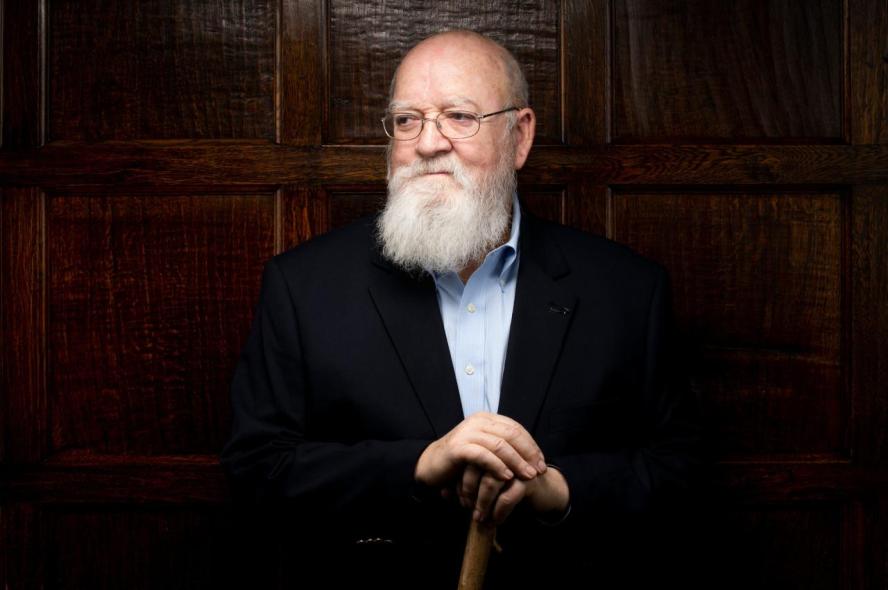Remembering Daniel C. Dennett, University and Fletcher Professor of Philosophy Emeritus

This message is being sent on behalf of the Dean of the School of Arts and Sciences.
Dear colleagues,
It is with great sadness that I write to inform you that Daniel C. Dennett, University and Fletcher Professor of Philosophy Emeritus, passed away early this morning. He was 82.
Dan Dennett was truly a once-in-a-generation scholar, teacher, and colleague. His career at Tufts spanned more than 50 years and we are incredibly fortunate to have had him as a part of our community for so long.
After receiving his AB in philosophy at Harvard University and his PhD in philosophy at the University of Oxford, Dan taught at the University of California, Irvine, from 1965 to 1971, before arriving at Tufts as an associate professor. He was promoted to professor in 1975 and chaired the Department of Philosophy from 1976 to 1982. Dan was named University Professor in 2000, Tufts’ highest honor for faculty members. That year, he also became the Fletcher Professor of Philosophy, and he received the distinction of University Professor Emeritus when he retired at the end of 2022.
Dan was a major intellectual figure internationally, with research centering on the philosophy of mind, philosophy of science, and philosophy of biology, particularly as those fields relate to evolutionary biology and cognitive science. He published 21 books, such as Darwin's Dangerous Idea: Evolution and the Meanings of Life (1995) and Breaking the Spell: Religion as a Natural Phenomenon (2006), and more than 560 articles. Interestingly, an off-Broadway play, “The Unbelieving,” which was staged in New York City in 2022, was directly inspired by interviews with clergy conducted for his book (with researcher Linda LaScola) Caught in The Pulpit: Leaving Belief Behind (2013).
At least 18 books have been written about Dan and his work, and he appeared in numerous documentaries, including A Glorious Accident (1993). In 2011 he collaborated with Tufts undergraduate Matthew Hurley and Assistant Professor of Psychology Reginald Adams to coauthor Inside Jokes: Using Humor to Reverse-Engineer the Mind (2011). He also chaired the Loebner Prize Committee that held the first three restricted Turing test competitions. Students and colleagues from around the world traveled to Tufts to study, work, and think alongside him.
Dan’s pioneering approach to his field has garnered international attention for more than half a century. He was elected to the American Academy of Arts and Sciences in 1987, and has received two Guggenheim awards, a Fulbright fellowship, and a fellowship at the Center for Advanced Study in the Behavioral Sciences. From the last decade alone, his awards included the Mind & Brain Prize (2011), the Erasmus Prize (2012), the SINe medal (2016), and the Carl Sagan Award (2018). Dan gave talks across the globe, even after retirement, and was awarded numerous honorary degrees, granted by universities spanning from Connecticut to Bucharest.
Dan assisted and advised former Tufts President Jean Mayer in his efforts to turn Tufts into a major research university. During Larry Bacow’s presidency, he created and hosted the Tufts High Table dinners, which gave faculty members the opportunity to get to know each other in non-committee contexts, and which led to many longstanding friendships and collaborations. He also served as director of the Tufts Center for Cognitive Studies since its inception in 1985 and co-founded the Curricula Software Studio in 1985.
Dan is survived by his wife of over 60 years, Susan, their son, Peter, their daughter, Andrea, and six cherished grandchildren, as well as his two sisters, Charlotte and Cynthia.
Those seeking support during this time may wish to make use of the services of the Tufts Employee Assistance Program and/or the University Chaplaincy.
Thank you for joining us as we send our heartfelt condolences to the Dennett family and to all those whose lives Dan touched.
Sincerely yours,
James M. Glaser
Dean, School of Arts and Sciences
Department:
Philosophy